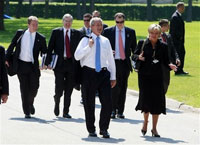Bush opens his last summit with European Union
U.S. President George W. Bush opened his last summit with the European Union on Tuesday with a long list of trans-Atlantic issues on his plate - Iran's nuclear ambitions, Afghanistan's woes, climate change, Mideast peace and perhaps even the U.S.-EU flap over chickens.

The agenda is broad for a summit that lasts less than a day, leaving doubts about what could be accomplished. There's also trade, rising world food prices, soaring gasoline costs, Lebanon and Kosovo's independence. But Tehran's nuclear program and global warming are two of the top concerns.
Bush started out by letting it slip that he won't be back to Europe again as president.
Meeting separately with Slovenian President Danilo Turk and Prime Minister Janez Jansa at Brdo Castle in the tiny town of Kranj before the U.S.-EU summit, Bush praised the beauty of this small Central European nation.
"My first trip to Europe as president began in Slovenia, and my last trip as president to Europe ...," Bush said, his thought trailing off.
"I wish you could stay here for a while, you could learn a great deal about local culture," Turk told him, a common refrain from Bush's hosts as he speed-travels around the world.
The president is trying to get Britain, Germany and France on board on Iran with a carrot-and-stick strategy - a package of new penalties and incentives aimed at preventing Iran from acquiring nuclear weapons. Bush wants the next package of U.N. sanctions to be tougher than the last.
His meetings with EU leaders in the host country of Slovenia were being held at Brdo Castle, the place where Bush first met former Russian President Vladimir Putin and declared: "I looked the man in the eye. I was able to get a sense of his soul."
Before leaving the castle to fly to Berlin for a social dinner with German Chancellor Angela Merkel, Bush is taking in an exhibition of white Lipizzaner horses, known for their elegant strutting. During his weeklong stay in Europe, he also is going to Italy, France, London and Belfast.
What to do about global warming has been a sticking point of U.S.-European relations.
The EU has pledged to cut greenhouse gas emissions by 20 percent by 2020. The United States wants any global agreement on climate change to include pledges by fast-growing economies, such as India and China.
"I think that there is a growing recognition, not only in the United States, but in Europe, as well, that in order for a new international climate agreement to be accepted, it's got to be both environmentally effective and economically sustainable," Dan Price, deputy national security adviser for international affairs, said Monday.
"In order to be environmentally effective, it's going to require actions and commitments not only by the developed countries but by the major emerging economies, as well," he said.
Some of the summit discussions will deal with the nuts-and-bolts of cooperation: the Transatlantic Economic Council, formed at last year's summit, to foster economic integration on both sides of the Atlantic by aligning regulations, accounting practices and erasing other roadblocks to expanding what is already a $500 billion (EUR 317 billion) trans-Atlantic relationship.
The U.S.-EU chicken flap is an example. Getting the EU's 11-year import ban on U.S. poultry lifted is being viewed as a test case for the new council, known as TEC. Europe is opposed to the way American chicken producers wash poultry in chlorinated water.
Proposals for lifting the ban so far have not pleased U.S. officials, but if a consensus can be reached through the new council, it could set the stage to resolve other long-standing trade disputes.
Subscribe to Pravda.Ru Telegram channel, Facebook, RSS!




